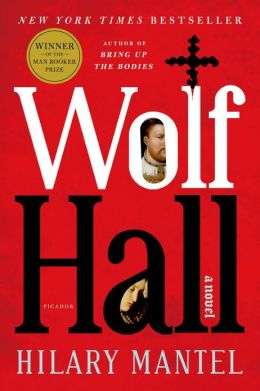Wolf Hall
Hilary Mantel
Mantel’s novel, which appeared in 2012 and has gone on to be a global best seller, has won numerous awards including the Man Booker Prize and The National Book Critic’s Circle Award. Wolf Hall is first in a trilogy on Thomas Cromwell and his rapid rise to power during the Tudor dynasty. The second, Bring Up The Bodies was recently released, and the third, The Mirror and the Light, is forthcoming.
Wolf Hall, described as a fictionalized biography, covers Cromwell’s life from 1500 to 1535. The consigliere rose from a working class background to become an indispensable confidante and guide to Cardinal Thomas Wolsey, adviser to King Henry XVIII, and went on to be one of Henry’s most powerful ministers—almost single-handedly ushering in the Protestant reformation. Mantel’s portrayal has been called an “intimate and well-rounded portrait of Cromwell as a pragmatic and talented man attempting to serve king and country amid the political machinations of Henry’s court.”
I haven’t read much historical fiction. I tend to be disappointed at the breaches that can occur—period oversights in references to food or terminology that break the authenticity of voice. But line for line, I don’t think you’ll find a writer more precise, and for that matter, more rich and imaginative than Mantel. Here is Stephen Greenblatt on Wolf Hall in The New York Review of Books.
In the most fully realized historical novels, the historical figures are not merely background material or incidental presences but the dominant characters, thoroughly reimagined and animated. They are at the center of our attention, and their actions in the world seem to carry the burden of a vast, unfolding historical process that is most fully realized in small, contingent, local gestures. Those gestures are ordinarily hidden from official chroniclers, but they are the special purview of the historical novelist. “Forget the coronations, the conclaves of cardinals, the pomp and processions,” Mantel writes in a kind of credo:
This is how the world changes: a counter pushed across a table, a pen stroke that alters the force of a phrase, a woman’s sigh as she passes and leaves on the air a trail of orange flower or rose water; her hand pulling close the bed curtain, the discreet sigh of flesh against flesh.
I’ve come late to Mantel’s work. She’s been publishing novels and short stories since 1985. Though it was not until she embarked on her historical novels that her work became widely known. Mantel’s writing process, based on years of research (Wolf Hall reportedly required five), and the meticulous charting of characters and events, has produced what might be called a dream formula—not one for success, though it has certainly brought her that—but for the framework that enables her to construct a stunning and often virtuoso blend of voice and point of view. Here is Cardinal Thomas Wolsey, the supercilious and manipulative adviser to Henry XVIII, after he’s been ousted from his exalted position—and his luxury apartment in London—for his interference in the King’s pursuit of Anne Boleyn:
Wolsey sits with his elbows on his desk, his fingers dabbing his closed lids. He takes a great breath, and begins to talk: he begins to talk about England. You can’t know Albion, he says, unless you can go back before Albion was thought of. You must go back before Caesar’s legions, to the days when the bones of giant animals and men lay on the ground where one day London would be built. You must go back to the New Troy, the New Jerusalem, and the sins and crimes of the kings who rode under the tattered banners of Arthur and who married women who came out of the sea or hatched out of eggs, women with scales and fins and feathers; beside which, he says, the match with Anne looks less unusual. These are old stories, he says, but some people, let us remember, do believe them.
Each character has a complexity and breadth that renders their conversations, thoughts, dreams and histories thrilling to read. Mantel can turns the act of rolling up a carpet into a surreal and stirring flight.
PBS will air a six-hour miniseries adaptation of Wolf Hall starring Damian Lewis and Mark Rylance, starting April 5.
—Lauren Alwan

